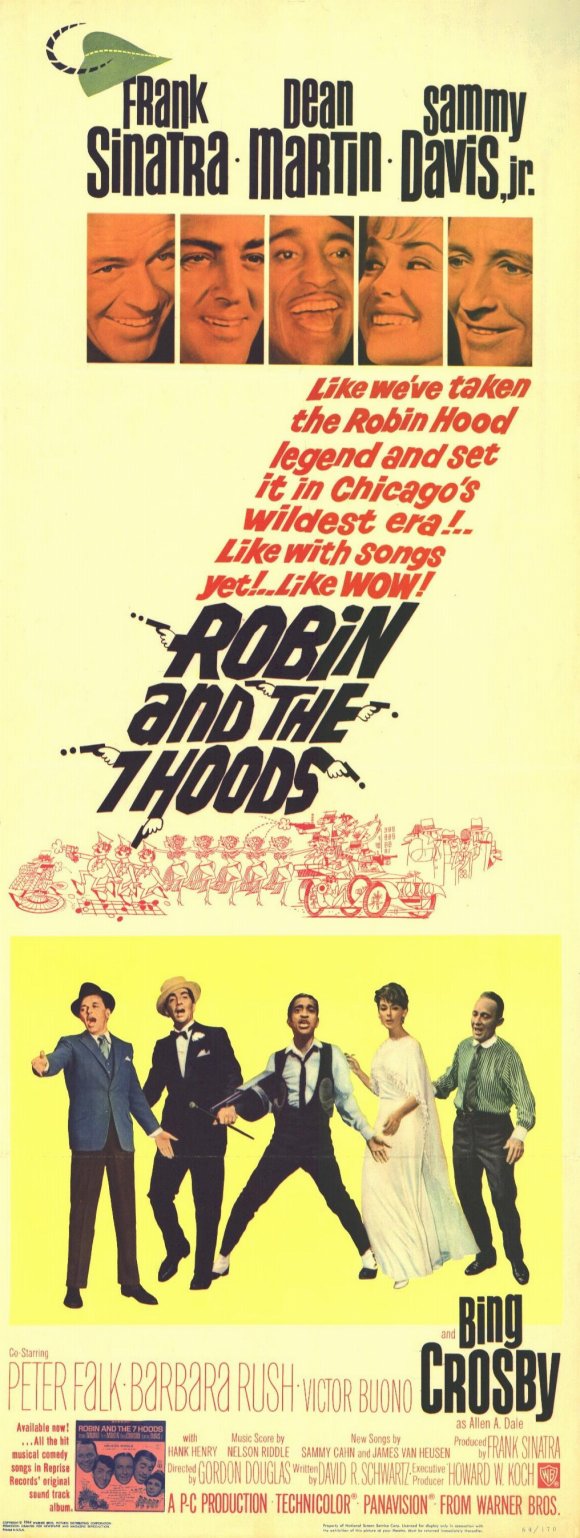
Musicals are a funny genre. I guess I did grow up on some, but only a special few, and they were never really my thing. So watching them now, with critical eyes, is interesting. The thing they remind me the most of are Muppet movies, with winkingly hammy performances and an obtuse and circuitous plot that doesn't really reward much inspection. Despite them not being "my thing," they sure are a lot of fun. It's hard to disapprove when everybody is having so much fun. Watch Peter Falk do an Italian crime boss (with the ever-so-Italian name "Guy Gisborne"); watch Bing Crosby roll through a rat-a-tat assault of three-dollar words; watch Sammy Davis, Jr, do a surprisingly funny song and dance routine about loving his guns. It's just a fun world.
To the extent that the plot or themes matter, this is the story of a smalltime hood who becomes a celebrity for giving to charity. Somehow this makes him a more successful hood (the best I can figure is, more people come to his speakeasy and gamble/drink because he gives the proceeds to orphanages and soup kitchens), and this continues to snowball until the jealous mob boss Gisborne and the confusingly devious Marian each want a piece of the action. Considering that crime is the name of the game here, it's hard to see how Gisborne can't win with his 7-to-1 manpower, massive empire -- stolen from Marian's father, Big Jim (a cameo from Edward G. Robinson, no less), though he managed to convince the revenge-hungry Marian that the sheriff was behind it all. Plus, Marian seems to drop the whole "I'll pay you any amount to avenge my father" as soon as Gisborne has the sheriff murdered, even though it sure looked like every crimelord in the city (except Robbo and his "merry men") partook in the murder simultaneously. Once dropped, Marian becomes a conniving mastermind, convincing the weaker willed men around her one by one to front her as she counterfeits money and hides behind Robbo's Robin Hood image.
It's interesting that every (halfway successful) attempt against Robbo is done by using public opinion against him. First he's framed for the Sheriff's murder, but it doesn't stick because Gisborne and his cronies try a little too hard. Then the funny-money gig blows up in his face (even though it was started by Little John and Marian while Robbo was being tried for murder) and again, it's public opinion vs Robin Hood. That's a nice touch.
I'm not sure what to make of the end -- our three main heroes dressed as Salvation Army Santas and ringing bells while Allan A. Dale (heh) runs off with Marian and -- as far as I can tell -- the accompanying fortune. Our plucky sort-of-anti heroes accept their fate with something akin to humility, sing Alan A. Dale's own song "Don't Be A Do-Badder" and carry on. Sure, they're merry men to the end, and Robbo and his men never do any real wrong (except for gambling and liquor, and some destruction of private property and so forth), but what does it mean that the prissy man who runs the orphanage gets the (evil) girl and the (dirty) money, and our relatively upstanding heroes get the shaft? Your guess is as good as mine.
But musicals are fun worlds. Like I said, everybody has fun, and it doesn't quite matter if it makes sense. And now, I'm neglecting a houseful of family on Christmas Eve, so I should get going.

No comments:
Post a Comment